Yes, satellites could fall from the sky
Debris from thousands of satellites could cause injuries


A free daily email with the biggest news stories of the day – and the best features from TheWeek.com
You are now subscribed
Your newsletter sign-up was successful
You could be hit by a falling satellite, according to a report to Congress by the Federal Aviation Administration (FAA). The report predicted that by 2035, satellites from large networks like SpaceX's Starlink could fall to the Earth and cause "one person on the planet … to be injured or killed every two years." Satellites like those from Starlink are meant to burn up in Earth’s atmosphere at the end of their service. However, some pieces of satellite debris may not incinerate and instead fall to the planet's surface, posing a risk of injury.
The Aerospace Corporation, the research group commissioned by the FAA to help produce the report, "assessed that the SpaceX spacecraft could each produce three pieces of debris of 300 grams." The group called that a conservative estimate, adding, "With the thousands of satellites expected to reenter, even a small amount of debris can impose a significant risk over time."
SpaceX, owned by billionaire mogul Elon Musk, called the report "preposterous, unjustified and inaccurate," claiming that it relied "on a deeply flawed analysis that falsely characterizes reentry disposal risks associated with Starlink," according to a letter obtained by CNN. "SpaceX's satellites are designed and built to fully demise during atmospheric reentry during disposal at end of life, and they do so," Musk's letter added.
The Week
Escape your echo chamber. Get the facts behind the news, plus analysis from multiple perspectives.

Sign up for The Week's Free Newsletters
From our morning news briefing to a weekly Good News Newsletter, get the best of The Week delivered directly to your inbox.
From our morning news briefing to a weekly Good News Newsletter, get the best of The Week delivered directly to your inbox.
Determining the exact risk from satellites is difficult "due to the uncertainties in reentry survivability calculations," Marlon Sorge, executive director of Aerospace's Center for Orbital and Reentry Debris Studies, told SpaceNews. "It is very difficult to get 'ground truth' data on what survives reentry by observing actual reentries as they occur randomly all over the world, not usually in convenient locations." SpaceX claimed the FAA "accepted the Aerospace report without any scrutiny or diligence, and then distributed this incorrect information to Congress."
A free daily email with the biggest news stories of the day – and the best features from TheWeek.com
Devika Rao has worked as a staff writer at The Week since 2022, covering science, the environment, climate and business. She previously worked as a policy associate for a nonprofit organization advocating for environmental action from a business perspective.
-
 How the FCC’s ‘equal time’ rule works
How the FCC’s ‘equal time’ rule worksIn the Spotlight The law is at the heart of the Colbert-CBS conflict
-
 What is the endgame in the DHS shutdown?
What is the endgame in the DHS shutdown?Today’s Big Question Democrats want to rein in ICE’s immigration crackdown
-
 ‘Poor time management isn’t just an inconvenience’
‘Poor time management isn’t just an inconvenience’Instant Opinion Opinion, comment and editorials of the day
-
 Nasa’s new dark matter map
Nasa’s new dark matter mapUnder the Radar High-resolution images may help scientists understand the ‘gravitational scaffolding into which everything else falls and is built into galaxies’
-
 Moon dust has earthly elements thanks to a magnetic bridge
Moon dust has earthly elements thanks to a magnetic bridgeUnder the radar The substances could help supply a lunar base
-
 How Mars influences Earth’s climate
How Mars influences Earth’s climateThe explainer A pull in the right direction
-
 The ‘eclipse of the century’ is coming in 2027
The ‘eclipse of the century’ is coming in 2027Under the radar It will last for over 6 minutes
-
 NASA discovered ‘resilient’ microbes in its cleanrooms
NASA discovered ‘resilient’ microbes in its cleanroomsUnder the radar The bacteria could contaminate space
-
 Artemis II: back to the Moon
Artemis II: back to the MoonThe Explainer Four astronauts will soon be blasting off into deep space – the first to do so in half a century
-
 The mysterious origin of a lemon-shaped exoplanet
The mysterious origin of a lemon-shaped exoplanetUnder the radar It may be made from a former star
-
 The 5 biggest astronomy stories of 2025
The 5 biggest astronomy stories of 2025In the spotlight From moons, to comets, to pop stars in orbit
